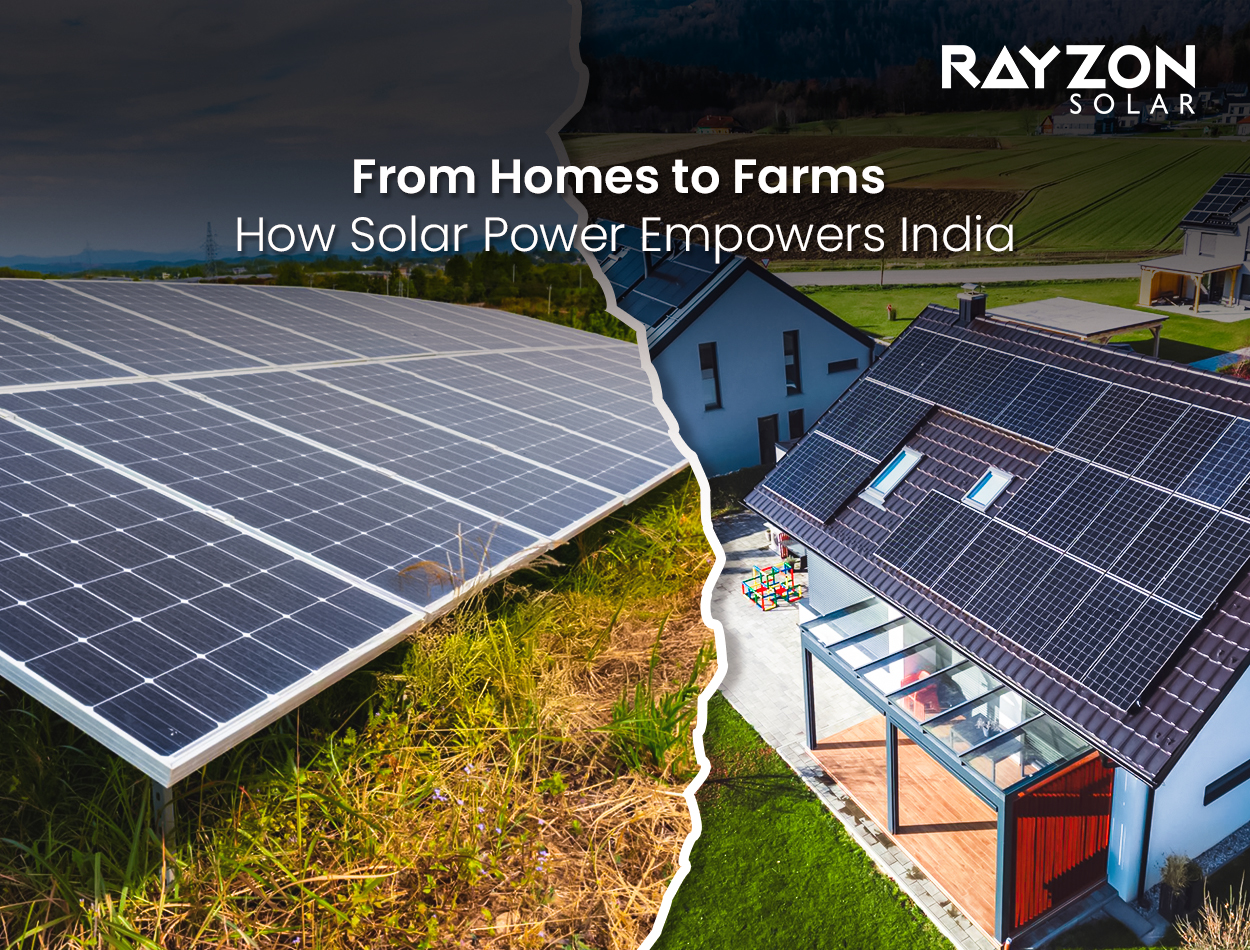
From Homes to Farms: How Solar Power Empowers India
Solar power in India has emerged as a transformative force that connects urban households, rural villages and farming communities to sustainable energy. From rooftop solar panels on residential buildings to solar irrigation systems that revolutionise agriculture, solar technology is changing the way we produce and consume electricity.
India, being one of the fastest-growing solar markets globally, is witnessing a clean energy revolution that not only reduces carbon emissions but also strengthens the economy by cutting energy costs and providing reliable power solutions.
With government support, innovative technologies and widespread adoption, solar power is reaching every corner of the country. Farmers benefit from solar water pumps, villages are illuminated through rural solar electrification and communities thrive with off-grid solar power. In this blog, we dive deep into the multiple ways solar power in India is empowering lives and shaping a greener future.
Solar Power in India: A Game-Changer
The demand for solar power in India has seen an exponential rise due to its affordability, scalability and eco-friendly nature. With growing emphasis on solar benefits for farmers, off-grid solar power and community-based solar projects, renewable energy is becoming accessible even in the most remote areas.
India is targeting over 500 GW of renewable energy capacity by 2030, with solar energy playing the most critical role. Government programs like Surya Ghar Yojana and PM Kusum Yojana are encouraging mass adoption of solar energy for homes, farms and industries.
Solar Energy for Homes: A Cost-Saving Solution
Urban households are turning to rooftop solar panels to reduce dependence on expensive grid electricity. By adopting solar energy for homes, residents can save up to 80-90% on electricity bills. With net metering policies in place, homeowners can even sell surplus electricity back to the grid, creating a dual benefit.
The Solar Rooftop Guide by Rayzon Solar helps homeowners understand installation and maintenance for maximum efficiency. Moreover, solar-equipped homes are seen as modern, eco-conscious and more valuable in the real estate market.
Solar for Agriculture: Fueling Food Security
Agriculture in India has traditionally been dependent on monsoon patterns and costly diesel pumps. The introduction of solar irrigation systems and solar water pumps is revolutionising the farming sector. Farmers now have reliable, clean and cost-effective solutions to water their fields throughout the year.
Government schemes such as PM Kusum Yojana are providing subsidies on solar pumps, allowing farmers to reduce operational costs significantly. Our blog Three Components of PM Kusum Yojana details how this program benefits rural farming.
Rural Solar Electrification: Empowering Villages
In rural India, millions of people once lived without consistent access to electricity. Rural solar electrification projects are now changing this scenario. Villages that relied on kerosene and firewood for lighting are now powered by off-grid solar power, improving education, healthcare and small-scale industries.
Community Solar Projects have emerged as a cost-effective model for powering multiple households. These initiatives not only ensure energy independence but also open up new avenues for rural entrepreneurship.
Rooftop Solar Panels: Urban Sustainability
With shrinking space in urban areas, rooftop solar panels are the perfect solution for homeowners and businesses. These systems are easy to install, require minimal maintenance and provide long-term savings.
Our blog Top Things to Look for in Solar Panels offers a guide on choosing panels that offer maximum output, durability and efficiency. By switching to rooftop solar, urban families are contributing to a cleaner environment and energy independence.
Solar Water Pumps: The Backbone of Modern Farming
Solar water pumps are increasingly replacing traditional pumps that run on diesel or electricity. These pumps are highly efficient, require little maintenance and work seamlessly even in remote farmlands.
Solar pumps also help reduce irrigation costs, allowing farmers to reinvest savings in crop improvement and storage solutions. With solar benefits for farmers becoming clear, these pumps are now widely subsidised by government policies.
Off-Grid Solar Power: Energy Without Limits
Off-grid solar power systems are a blessing for locations that are far from the main power grid. Be it remote villages, mountain resorts, or forest regions, off-grid solutions ensure a continuous power supply.
Our blog Solar Energy for Off-Grid Living explains how these systems provide independence from unpredictable grid electricity and power cuts.
Solar Power for Communities
Community solar projects are designed to power entire neighbourhoods or villages. These large-scale solar systems help reduce the cost per unit and make clean energy accessible to low-income households.
By installing solar electricity for villages, communities gain more than just energy—they achieve better education facilities, healthcare support and enhanced livelihood opportunities.
Solar Electricity for Villages
The introduction of solar electricity for villages has transformed rural life. Children can now study under proper lighting, businesses operate after sunset and healthcare facilities run with stable power.
Projects like Benefits of Solar Energy highlight how rural electrification improves the overall quality of life and boosts the local economy.
Solar Benefits for Farmers
From reducing operational costs to increasing crop yields, solar benefits for farmers are numerous. Farmers no longer depend on costly fuel or erratic grid power.
Our blog Benefits of Solar Energy explains how adopting solar-powered systems increases agricultural productivity while reducing the carbon footprint.
Government Policies Boosting Solar Growth
Government support has been pivotal for the success of solar power in India. Subsidies, low-interest loans and initiatives like the Solar Park Scheme and PM Kusum Yojana are accelerating installations across the country.
The Government Schemes and Solar Subsidies blog details how these programs make solar solutions affordable for everyone.
Solar Power in Smart Cities
Solar energy is playing a vital role in India’s Smart Cities Mission. From powering street lights to public transportation, solar integration ensures energy efficiency and cost savings.
Read our blog on Commercial Solar Solutions to understand how solar is shaping the future of urban infrastructure.
Innovation in Solar Technology
New technologies like bifacial panels, TOPCon modules and hybrid solar systems are increasing the efficiency and lifespan of solar panels.
Our article Top Solar Technology Trends explores the cutting-edge innovations that are revolutionising solar adoption in India.
Solar Power and Job Creation
The solar industry is creating thousands of jobs across manufacturing, installation and maintenance sectors. From The Manufacturing Process of Solar Panels to system design, skilled labour is in demand.
By investing in solar energy, India not only achieves energy independence but also boosts local employment and economic growth.
Conclusion: A Solar-Powered Future for All
From urban homes to rural farms, solar power in India is driving inclusive growth and sustainability. Whether through rooftop solar panels, solar water pumps, or off-grid solar power, the benefits are undeniable—reduced costs, cleaner energy and energy independence.
As India continues its renewable energy journey, adopting solar for agriculture and rural solar electrification will pave the way for a brighter, greener future for all. To explore more, read our guides on Maximising and Choosing the Best Solar Panels.
Frequently Asked Questions (FAQs)
- What is the role of solar power in India’s rural development?
Solar power in India plays a crucial role in rural development by providing off-grid electricity, improving irrigation with solar water pumps and reducing dependence on fossil fuels. It helps villages gain energy independence and promotes small-scale industries. - How do rooftop solar panels benefit homeowners?
Rooftop solar panels reduce electricity bills by generating free power from the sun. Homeowners can also earn credits through net metering and increase property value by adopting clean energy solutions. - Why are solar irrigation systems important for Indian farmers?
Solar irrigation systems ensure a reliable and cost-effective water supply for farms. They reduce diesel usage, save money and allow farmers to irrigate their fields without relying on grid power. - Can off-grid solar power work during cloudy days?
Yes, off-grid solar systems can work on cloudy days using battery storage. As explained in our blog Increase Solar Power Output on Cloudy Days, modern panels are designed to produce energy even in low sunlight. - Are there government subsidies for solar power in India?
Yes, the government offers subsidies under schemes like PM Kusum Yojana and Surya Ghar Yojana for both residential and agricultural solar installations. Check out our blog, Government Schemes and Solar Subsidies 2025, for details.



